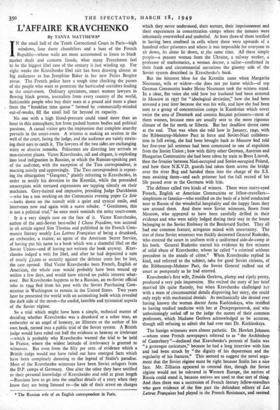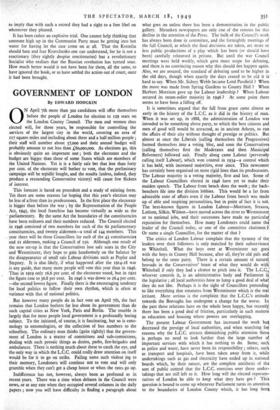L'AFFAIRE KRAVCHENKO
By TANYA MATTHEWS*
IN the small hall of the Tenth Correctional Court in Paris—high windows, four dusty chandeliers and a bust of the French Republic—whose walls are more accustomed to listen to black market deals and customs frauds, what many Frenchmen feel to be the biggest libel case of the century is just winding up. For eight weeks the Kravchenko libel suit has been drawing almost as big audiences as has Josephine Baker in her new Folies Bergere revue. The French police have a tough time checking the passes of the people who want to penetrate the barricaded corridors leading to the court-room. Ordinary spectators, smart women lawyers in flowing black gowns, journalists from every country of the world, fashionable people who buy their seats at a pound and more a place from the " breakfast time queue " formed by commercially-minded out-of-works, fill the small hall far beyond its capacity.
No one with a high blood-pressure could stand more than an hour in this atmosphere, hot from packed human bodies and political passions. A casual visitor gets the impression that complete anarchy prevails in the court-room. A witness is making an oration in the well of the court, facing the judge, and the audience are vainly strain- ing their ears to catch it. The lawyers of the two sides are exchanging witty or abusive remarks. Policemen are directing late arrivals to non-existent places. Victor Kravchenko, tall and elegant, is exploding into loud indignation in Russian, to which the Russian-speaking part of the audience, with the exception of the Tass correspondent, is reacting noisily and approvingly. The Tass correspondent is repeat- ing the objurgation " Gangster," plainly referring to Kravchenko, in order to testify his devotion to the Kremlin, while the peroxided stenotypists with tortured expressions are tapping silently on their machines. Grey-haired and impassive, presiding Judge Durckheim —who has a son working on the Communist evening paper Ce Soir —looks down on the tumult with a quiet and cynical smile, and intervenes now and again with a suave rebuke. " Gentlemen, this is not a political trial," he once more reminds the noisy court-room.
It is a very simple case on the face of it. Victor Kravchenko, author of the anti-Soviet best-seller I Chose Freedom, was accused in an article signed Sim Thomas and published in the French Com- munist literary weekly Les Lettres Franfaises of being a drunkard, an embezzler, a traitor, an agent of the American Secret Service, of having put his name to a book which was a shameful libel on the Soviet Union—and Of having not written the book anyway. Krav- chenko lodged a writ for libel, and after he had deposited a sum of nearly £2,000 as security against the defence costs lest he lost, the case opened. Had Victor Kravchenko been French, English or American, the whole case would probably have been wound up within a few days, and would have stirred no public interest what- ever. But Kravchenko happens to be a Russian, an ex-Soviet official who in 1944 fled from his post with the Soviet Purchasing Com- mission in Washington to remain in the United States. Two years later he presented the world with an astonishing book which revealed the dark side of the moon—the sordid, horrible and tyrannical aspects of the Soviet regime.
So a trial which might have been a simple, technical matter of deciding whether Kravchenko was a drunkard or a sober man, an embezzler or an angel of honesty, an illiterate or the author of his own book, turned into a public trial of the Soviet system. A British judge would have ruled out half the evidence as hearsay or irrelevant —which is probably why Kravchenko wanted the trial to be held in France, where the widest latitude of irrelevancy is granted to witnesses. But even from the fifty per cent. of evidence which a British judge would not have ruled out have emerged facts which have been completely damning to the legend of Stalin's paradise. Most of the Kravchenko witnesses have been Soviet refugees from the D.P. camps of Germany. One after the other they have testified to their personal knowledge of Kravchenko and told at great length —Russians love to go into the smallest details of a story when they know they are being listened to—the tale of their arrest on charges * The Russian wife of an English correspondent in Paris.
which they never understood, their torture, their imprisonment and their experiences in concentration camps where the inmates were inhumanly overworked and underfed. At least three of them testified to having been confined in cells where there were upwards of a hundred other prisoners and where it was impossible for everyone to sit down, let alone lie down, at the same time. All these simple people—a peasant woman from the Ukraine, a railway worker, a -professor of mathematics, a woman doctor, a sailor—confirmed in their frank and circumstantial narrations the gloomy side of the Soviet system described in Kravchenko's book.
But the bitterest blow for the Kremlin came when Margarita Neumann, wife or widow—she does not yet know which—of top German Communist leader Heinz Neumann took the witness stand. In a clear, flat voice she told how her husband had been arrested in Moscow in 5937 for "ideological deviation," how she had been arrested a year later because she was his wife, and how she had been sent to a group of concentration camps in Kazakstan which cover twice the area of Denmark and contain 800,000 prisoners—most of them women, because men are usually sent to the more rigorous climate of the far north or Siberia. But her deadliest thrust came at the end. That was when she told how in January, 1940, with the Ribbentrop-Molotov Pact in force and Soviet-Nazi collabora- tion in full swing, she had been brought back to Moscow knd told her five-year jail sentence had been commuted to one of expulsion from the Soviet Union ; how with thirty other German, Austrian and Hungarian Communists she had been taken by train to Brest Litovsk, then the frontier between Nazi-occupied and Soviet-occupied Poland, and how there N.K.V.D. guards had taken them across the bridge over the river Bug and handed them into the charge of the S.S. men awaiting them—and each prisoner had the full record of his life passed over to the Germans with him.
The defence called two kinds of witness. There were starry-eyed French, English or American Communists or fellow-travellers- simpletons or fanatics—who testified on the basis of a brief conducted tour to Russia of the wonderful hospitality and the happy faces they saw around them. And there were Soviet witnesses, flown from Moscow, who appeared to have been carefully drilled in their evidence and who were safely lodged during their stay in the house belonging to the Soviet Embassy in the Boulevard Suchet. They all had one common feature, arrogance mixed with uncertainty. The star of these Soviet witnesses was thickly decorated General Rudenko, who entered the court in uniform with a uniformed aide-de-camp at his heels. General Rudenko started his evidence by five minutes of solid abuse of Kravchenko, whom he called " a criminal without precedent in the annals of crime." When Kravchenko replied in kind, and referred to the subject, tabu for good Soviet citizens, of the Ribbentrop-Molotov Pact, the Soviet General stalked out of court as pompously as he had entered.
Kravchenko's first wife, Zinaida Gorlova, plump and ripely pretty, produced a very pale impression. She recited the story of her brief married life quite fluently, but when Kravchenko challenged her with a mass of circumstantial details disproving her story, she could only reply with mechanical denials. As mechanically she denied ever having known the woman doctor Anna Kashinskaya, who testified to having studied medicine with her at Dniepropetrovsk, and who unhesitatingly reeled off to the judge the names of their common professors, which Madame Gorlova acknowledged to be accurate, though still refusing to admit she had ever met Dr. Kashinskaya.
The foreign witnesses were almost pathetic. Dr. Hewlett Johnson —whom some French newspapers referred to as " the Archbishop of Canterbury "—declared that Kravchenko's portrait of Stalin was " a grotesque caricature," because he had a long interview with him and had been struck by " the dignity of his deportment and the regularity of his features." This seemed to suggest the novel argu- ment that the Soviet regime must be right because Stalin has a nice face. Mr. Zilliacus appeared to contend that, though the Soviet regime would not be tolerated in Western Europe, the natives of Russia could stand it, because natives are used to that sort of thing. And then there was a succession of French literary fellow-travellers who gave evidence of the fine part the defendant editors of Les Lettres Francaises had played in the French Resistance, and seemed to imply that with such a record they had a right to a free libel on whomever they pleased.
It has been rather an explosive trial. One cannot help thinking that someone high up in the Communist Party must be getting into hot water for having let the case come on at all. That the Kremlin should hate and fear Kravchenko one can understand, for he is not a reactionary (they rightly despise reactionaries) but a revolutionary Socialist who realises that the Russian revolution has turned sour. How much better would it not have been for them, all the same, to have ignored the book, or to have settled the action out of court, once it had been brought.







































 Previous page
Previous page